Healing in both directions: NH nonprofit transforms rescues into service dogs for veterans
|
Published: 09-04-2024 2:50 PM
Modified: 09-05-2024 12:36 PM |
As soon as U.S. military veteran Vince Ylitalo settled into his armchair in the living room of his Concord home, his service dog Tippy curled up at his feet and closed her eyes. Though resting, she remained alert to Ylitalo’s every need, nuzzling his legs the moment he started talking about his past.
“She’s helped me dramatically,” Ylitalo said. “Without her, I would not have been out in the community doing anything. She had to get me out because I had to walk her. Just having her around, she’s very intent with me. She knows me.”
The nine-year-old German shepherd eyed her owner, who reached down and stroked her light-colored fur. She leaned into his hand as he whispered, “Good girl, Tippy” and fed her a treat.
Ylitalo joined the military at age 17 and completed basic training before graduating high school. He served for 38.5 years in both active duty and the reserves. By the time Ylitalo retired as a master sergeant in 2017, he had been sent all over the world, including two tours in Iraq.
“When I came back, I was really, really, really, really in a bad spot,” Ylitalo said. “I needed help. I know I needed help after a while. My mom kept telling me, ‘You need help. You need help.’”
He initially declined to seek help because he thought to himself, “Everybody else is messed up.” Eventually agreeing to see a therapist through the local Veterans Affairs office (VA), Ylitalo realized he struggled to shut off the decades of instincts he’d honed in the military to keep himself safe.
“You were constantly, go, go, go in the military,” Ylitalo said. “You had to be active. You had to have that third sight. It was fight or flight.”
When he transitioned back to civilian life, he kept asking himself, “Now what do I do?” The military has a structured process for starting service, but leaving the military often creates a lack of structure that can leave people feeling lost in their lives back home.
Article continues after...
Yesterday's Most Read Articles
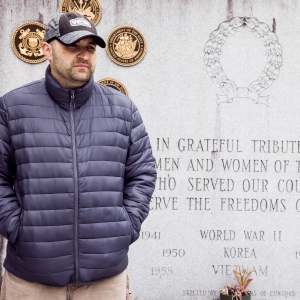 ‘Would you raise your right hand?’ — Local veterans consider the meaning of Memorial Day
‘Would you raise your right hand?’ — Local veterans consider the meaning of Memorial Day
 Jesse Sullivan pleads guilty to second-degree murder of half-brother, Zackary
Jesse Sullivan pleads guilty to second-degree murder of half-brother, Zackary
 ‘Bittersweet’: The Post on Main Street closes Friday
‘Bittersweet’: The Post on Main Street closes Friday
 Messy parking around Concord’s bus terminal won’t get less messy any time soon
Messy parking around Concord’s bus terminal won’t get less messy any time soon
 New Hampshire school phone ban could be among strictest in the country
New Hampshire school phone ban could be among strictest in the country
 ‘Something to chase’: Pascal Zabayo’s art fundraiser grows soccer from Concord to Kampala, Uganda
‘Something to chase’: Pascal Zabayo’s art fundraiser grows soccer from Concord to Kampala, Uganda
“I’m sitting in a corner of my house thinking, ‘How many doors are there? How many people around? What are they doing around?’ It was hard for us to react. I didn’t want to go out. I didn’t want to have that feeling, so I stayed home, which is one of the things that getting a dog helped me with,” he added.
His therapist recommended a service dog and put him in contact with Operation Delta Dog, an organization that would completely change his life. The nonprofit, based in Hollis, trains rescue dogs to become service dogs and pairs them with veterans with post-traumatic stress disorder, military sexual trauma, and/or traumatic brain injuries. The partnership helps heal not only the veterans but also the dogs, many of whom have come from violent or abusive situations.
“We call it our own version of Match.com,” said Charlotte Troddyn, executive director of Operation Delta Dog. “You can just see the hearts and the stars in the air when the dog and the veteran have decided for themselves that they’re a match, often before we even know it. It does feel kind of like magic has happened in the room.”
Ylitalo, who has always loved dogs, says that Tippy has drawn him outside himself and back into the world. The pair has been together since 2021.
“You’ve got to think about the dog,” he said. “It will help open you up. It’s not about me anymore. I need to help support the dog. It’s no longer looking inwards, you’re looking outwards.”
Tippy can pick up objects Ylitalo has trouble bending down to reach, including her own leash. She accompanies him nearly everywhere, and, thanks to her support and companionship, he feels empowered enough to try activities he never would have been able to otherwise, including joining a bee-keeping club at the VA.
“I tied her up near a tree near me, so she heard and could see I was right there,” Ylitalo said. “Once in a while, when I was getting a little nervous, I just went over, petted her a little bit. She calmed me down, and I went back to the bees.”
He also tried tai chi and yoga and says that now he has Tippy, he’ll try just about anything at least once.
Operation Delta Dog has matched 75 veterans with service dogs in the 11 years since the organization’s beginning. Twenty-six new veterans are currently in the program, with 11 more slated to join. The organization partially trains the dogs before matching them with the veterans but then spends a year and a half afterward training the dogs to meet the veterans’ specific needs.
“There’s a lot that our veterans are dealing with that the dog isn’t going to completely cure, and we feel that having the veterans with us for a year and a half really helps them process through what they need with the dog by their side,” Troddyn said. “They’re doing it in classes with other veterans that have similar histories and understand their struggles better than any of us could.”
At the end of the 18 months, the dogs and veterans participate in a graduation ceremony. Even afterward, the organization remains a supportive presence in the pairs’ lives. When Ylitalo needed to temporarily walk with a cane, he reached out to his trainers at Operation Delta Dog because he was worried about how Tippy would adjust to the change. He also remains in touch with the other veterans who trained at the same time as him and participates in Operation Delta Dog’s mentorship program, which connects him with other local veterans starting the process.
“We really become part of the veteran’s family,” Troddyn said. “We know their families. We know their kids. We’ve helped people get into college. We’ve helped people move. We’ve helped people be able to go to their niece’s wedding that they never thought they would be able to go to. Sometimes, if we know a big thing is coming, then we’ll make mock situations so we can all practice together. Just having that really specific improvement, and each of our veterans gets really personalized training, I think is why the pairings are so successful.”
There is currently no federal or VA funding for service dogs for veterans with post-traumatic stress disorder, military sexual trauma, and traumatic brain injuries, Troddyn said. The veterans participate in the program for free, but each pairing costs the organization between $25,000 – $30,000 because of the costs of dog food, kennel upkeep, training personnel, and medical care. However, Troddyn does not want money to be a limiting factor on the number of pairings, and she aims to avoid delaying the pairing process with a long waitlist.
“We know that by the time the veteran calls us, they’ve tried a lot of things,” she said. “We kind of feel like we’re one of their last calls before they make a very final decision. Nobody thinks to get a service dog first. You’ve tried medication, you’ve tried therapy, which is very important. You’ve sort of tried hiding from society for a while, so we just don’t feel in good conscience that we could tell somebody that they have to wait for two years if they’ve been brave enough to pick up the phone and make the call.”
Both Ylitalo and Troddyn acknowledge that asking for help can be intimidating.
“So many of our veterans delay calling us, even though they want to, because we hear this consistently from every single one of them: They think that there’s somebody out there that needs it more, deserves it more, is worse off than them,” Troddyn said. “They all tell us that they don’t feel that they deserve this. I want them to know that if they are thinking that, there’s nobody out there more deserving than them.”
Ylitalo, who said he cannot emphasize enough how transformative Operation Delta Dog and the VA have been for him, encouraged veterans having a hard time to reach out for help.
“I keep telling people, you’ve got to be your own advocate,” he said. “If you’re not, no one else is going to fight for you”
Rachel Wachman can be reached at rwachman@cmonitor.com.

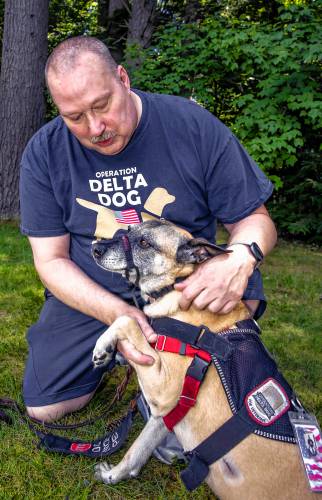
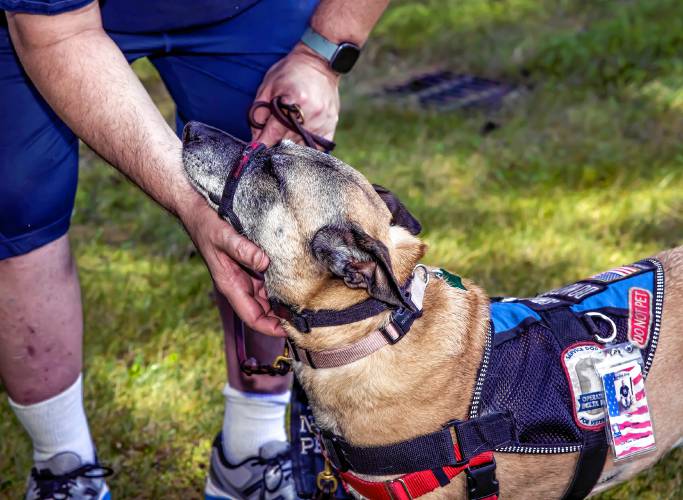
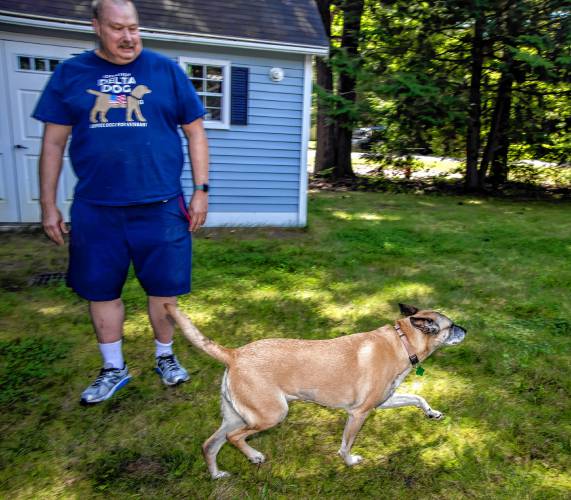
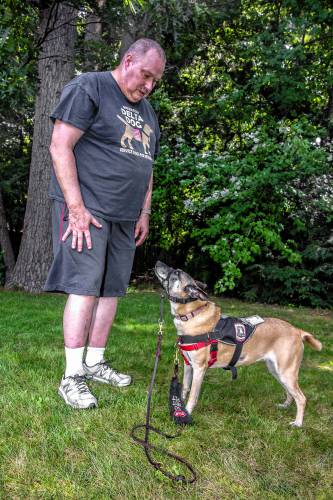
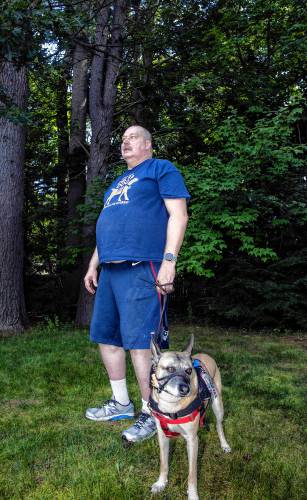
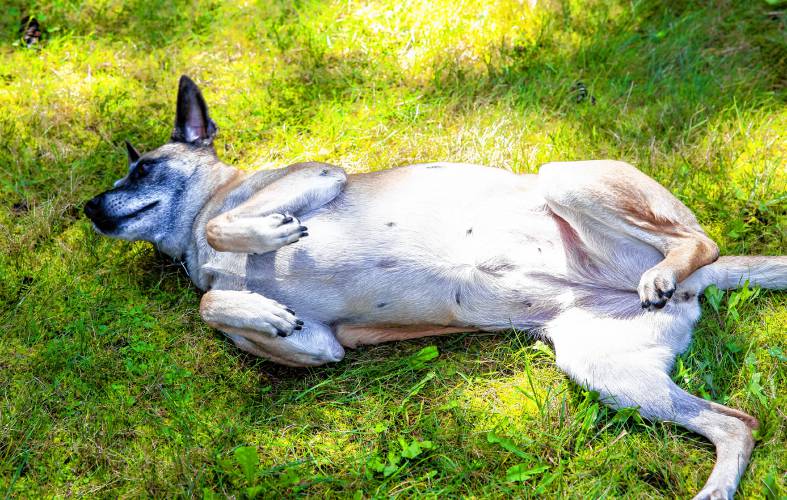






 In echo of 2014 struggle, Market Basket board sidelines ‘Artie T.’ from CEO spot
In echo of 2014 struggle, Market Basket board sidelines ‘Artie T.’ from CEO spot Historic former Boscawen library building on sale – again
Historic former Boscawen library building on sale – again
